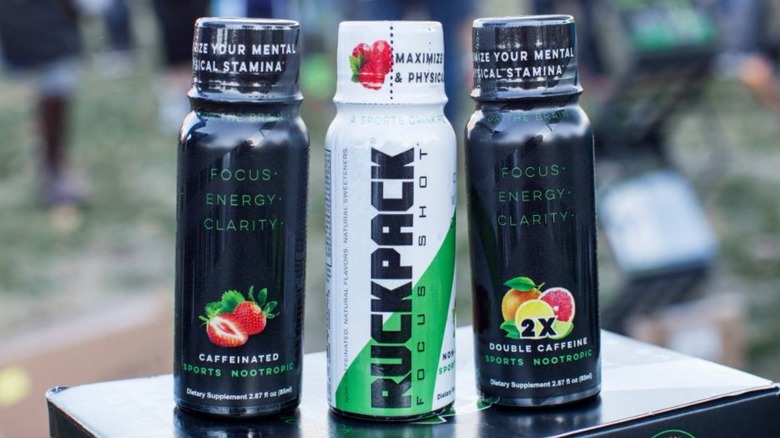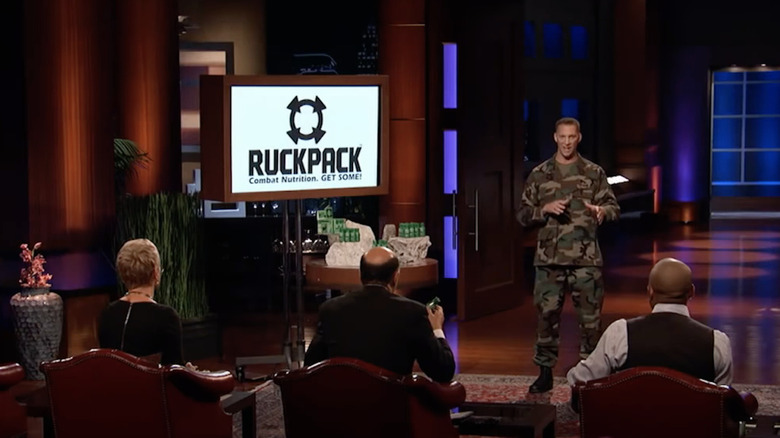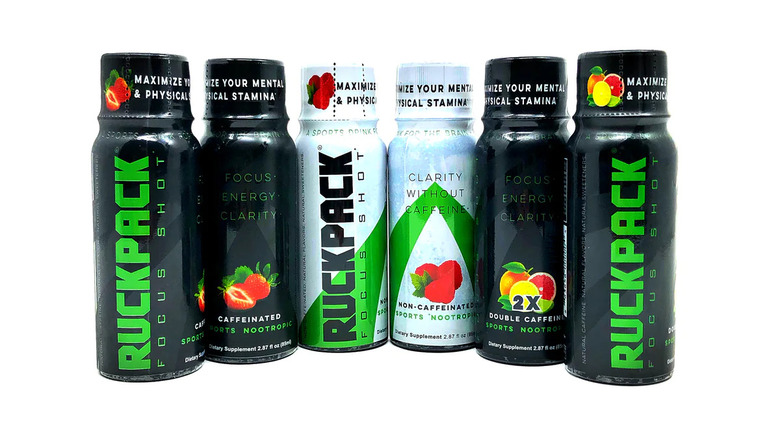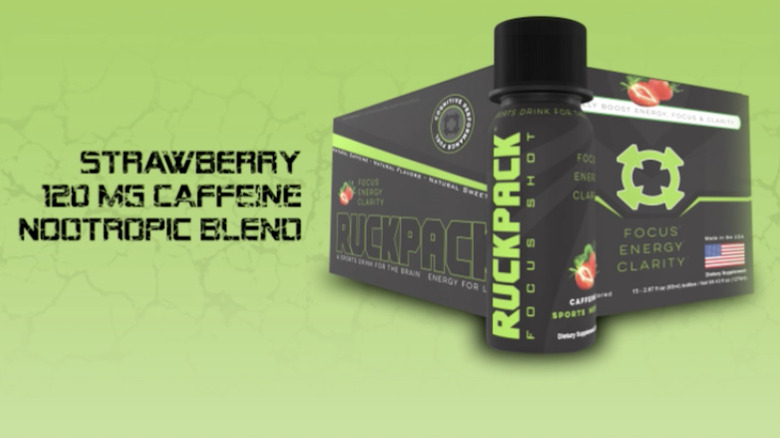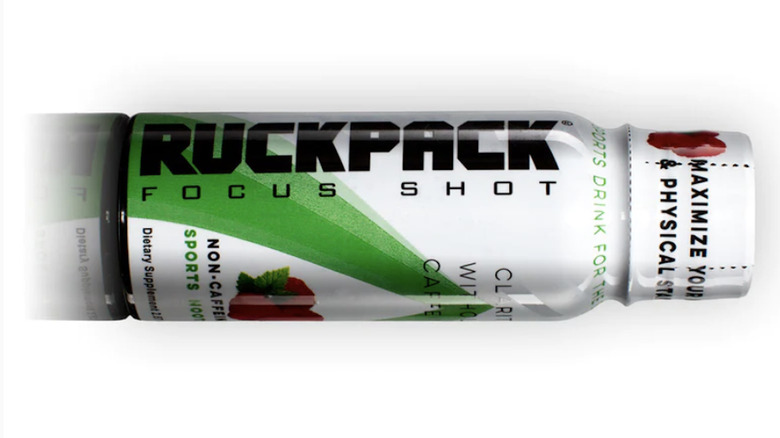What Happened To RuckPack After Shark Tank?
"Shark Tank" has seen its share of kooky food and drink pitches, but one energy drink business sticks out as one of the most memorable "Shark Tank" companies and an example of how to win the hearts of the show's celebrity investors. The product, called RuckPack, appeared on the show in 2012, energizing the Sharks with its simple alternative to unhealthy energy drinks.
If you've seen the light and learned that drinking Red Bull is bad for you, RuckPack provided a nice solution. Claiming to rise above the crashing downsides of popular caffeinated and sugar-loaded beverages, RuckPack even boasted nutritional benefits. The idea came to Major Robert Dyer, a professor and Marine Corps member, during his service in Afghanistan. He wanted a drink that provided a rush of energy to his fellow marines alongside a dose of crucial vitamins and minerals — two things that were sorely needed during long, tiring days in the field. The product embraced its military roots in its name — which references military "ruck" backpacks that only carry "exactly what you need, and nothing else," in Dyer's words to the Sharks.
Dyer was asking for $75,000 in exchange for 10% equity in his company. His product and pitch were successful with the Sharks, with multiple investors interested. Dyer ultimately left with a deal from Robert Herjavec and Kevin O'Leary, which helped give RuckPack a considerable boost the following year. However, the company has had a tumultuous decade since appearing on the show, going through multiple CEOs and manufacturing difficulties.
Did RuckPack hook any sharks?
Major Robert Dyer wore his uniform during his "Shark Tank" appearance, where he gave the Sharks a straightforward pitch and offered samples of his product. Dyer assured the Sharks that his product was healthier than other energy shots on the market. The product's branding leaned on its military background, with specific language on the packaging and advertising saying it was "prepared for Special Operations Forces" and "tested in combat."
Dyer impressed the potential investors with his sales numbers — he'd sold 15,000 bottles of RuckPack in a month — though he was waiting on more inventory and struggling to meet demand. With a new infusion of cash and a proposed $750,000 valuation, Dyer was hoping to decrease per-bottle production costs by 35 cents and to grow the business with partners.
Most of the Sharks were impressed, though Barbara Corcoran had concerns about the amount of his own money Dyer had sunk into the company, and Mark Cuban worried that Dyer's full-time professor job wouldn't give him enough time to devote to the business. Kevin O'Leary called Dyer's story "fantastic" and was the first to offer the Major his proposed 10% equity in exchange for $75,000 cash. But that wasn't all: Robert Herjavec wanted to jump in too, offering another $75,000 alongside O'Leary, upping the Sharks' joint equity in RuckPack to 20%. Dyer accepted the deal.
RuckPack After Shark Tank
RuckPack's appearance on "Shark Tank" gave its sales a massive spike, with the company's revenue shooting to $500,000 and the product making it into the Walgreens beverage aisle as part of a $4 million distribution deal, landing on the shelves of nearly 10,000 retail locations. Unfortunately, RuckPack's popularity also came with some problems. Major Robert Dyer was struggling to manage his CEO duties when his son had health challenges, prompting him to pass the helm of CEO to fellow veteran Derek Herrera in 2014. Unfortunately, Herrera's reign took a toll on business and caused cash flow problems for the company. By the time RuckPack appeared on an episode of "Beyond the Tank" in 2016, another CEO had taken over — this time it was Major Dyer's childhood friend Jimmy Patrick O'Brien.
Investor Kevin O'Leary visited the company and expressed his skepticism in the face of the instability RuckPack seemed to be facing. However, he was also impressed with the new flavors and formulas the company was rolling out. O'Leary also encouraged a plan to recruit veterans to sell the product. However, since RuckPack's appearance on "Beyond the Tank," things have remained complicated. The product was completely sold out on the RuckPack website in 2021. While the drink is now available for purchase again on the RuckPack website in 2023, it's no longer in stock on Amazon and doesn't appear to be offered by other retailers.
Is RuckPack still going strong?
It appears that Jimmy Patrick O'Brien is no longer RuckPack's CEO, having stepped down in 2017 according to his LinkedIn. Instead, Robert Dyer appears to be running things again.
All in all, RuckPack appears to have downsized quite a bit since its post-"Shark Tank" high. Reviewers of the product have raved about the "clean rush" and "concentration boost" the product provides, praising how it provides the benefits of a typical energy drink without the jitters and crash potential. However, many fans are frustrated they haven't been able to find it on Amazon. The company's Instagram is still active, but doesn't seem focused on advertising many new products. RuckPack's website offers three 3 oz energy shot flavors: strawberry, citrus, and raspberry, all sold in 15 packs for $49.99. You can also buy a 6-pack sampler of the flavors for $20.99.
It's likely that the rise of nootropic supplements and drinks in the past couple of years has made for some stiff competition for RuckPack, which also advertises nootropics as an important element of its formula. The increasingly crowded energy drink category also likely hasn't made things any easier for the company.
That said, the company appears to have stabilized at its current smaller size. According to Kona Equity, it's been making roughly $2.2 million in revenue a year since 2021.
What's next for RuckPack?
There's no news of new products in the pipeline from RuckPack, and the company's future looks pretty foggy at the moment. While the company released new information and advertising videos in 2022, it doesn't appear that CEO Robert Dyer is currently investing a lot more time and money into growing the company much further. He hasn't spoken about the business or its future publicly in some time. Instead, he seems to prefer sticking with a smaller business model as he aims his focus elsewhere.
According to his personal LinkedIn, Dyer appears to have his hands full with other endeavors in the meantime. He serves full-time as the CEO of Eagle Tech Corp, an IT solutions and cybersecurity company, and is also part-time Director of Operations for "Torn Warriors," a non-profit organization that helps disabled veterans participate in sports.
While RuckPack hasn't exactly taken off in the decade since its appearance on "Shark Tank," it hasn't entirely crashed and burned either — not something that can be said for other businesses that have been on the show.
